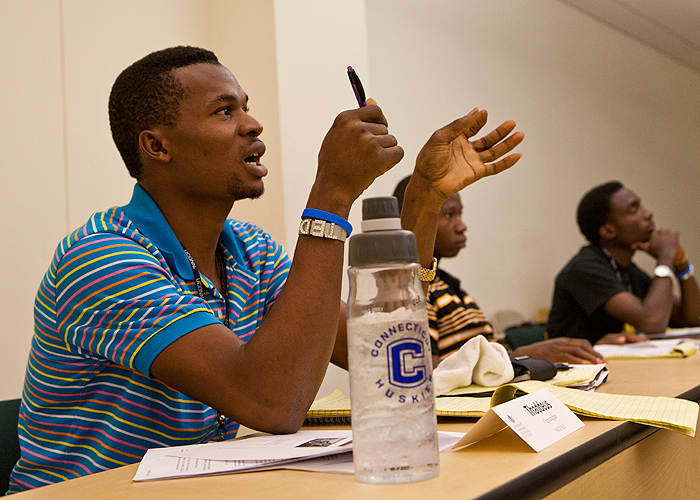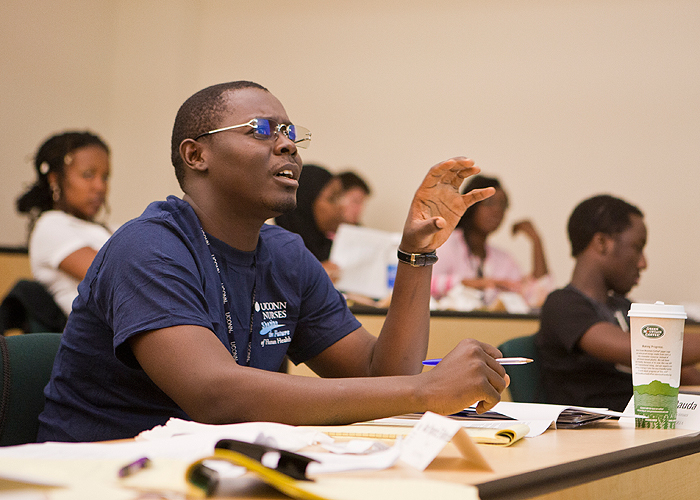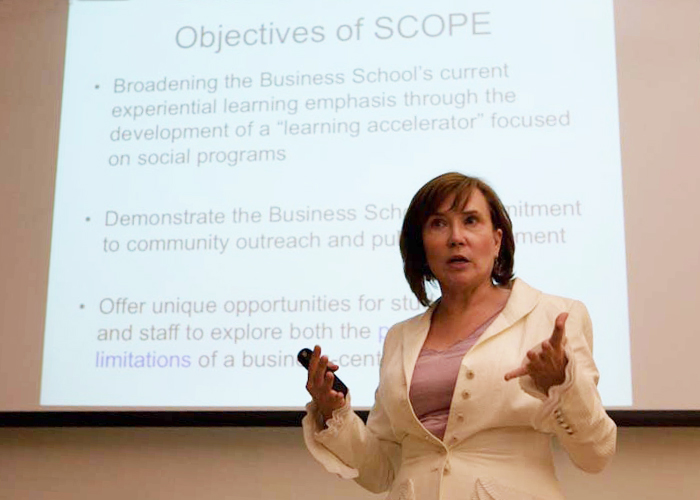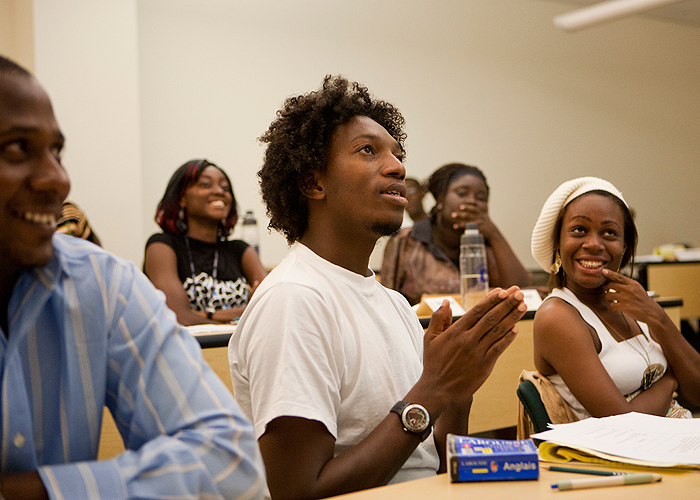Wynd DeShaw Harris paced the room as she spoke to 20 African college students about the importance of passion, plans, and determination in bringing an entrepreneurial idea to fruition. The students listened raptly.
Then came the question, one that an American student would be unlikely to pose.
“Sometimes the government stops you,” says Patrick Obeng-Asiedu, a Ghanaian who was academic director of the program. “What do you do then? They can crush your passion, your determination.”
Harris gave them a truly American answer.
“Sometimes you have to be sneaky,” she said, crouching to underscore her point. “Fly under the radar. Don’t put everything out there right away, not until you’ve got some support.”

The students – from Senegal, Mali, Nigeria, and Côte d’Ivoire (Ivory Coast) – chuckled. Harris, an assistant professor-in-residence of marketing with the School of Business and director of the Sustainable Community Outreach and Public Engagement (SCOPE) Accelerator, had their attention.
The presentation was one of more than two dozen in which the students participated during the five-week program titled ‘The Study of the U.S. Institute.’ The program, which began in mid-July, was developed and facilitated by the Global Training and Development Institute (GTDI) at the Center for Continuing Studies.
The institute, for college student leaders from sub-Saharan Africa, is part of a broader U.S. Department of State initiative designed to promote a better understanding of the United States abroad and to help develop future world leaders. Funded by a $231,782 cooperative agreement from the U.S. Department of State, the GTDI program included the study of U.S. history, government, and society with a focus on social entrepreneurship. It culminated with student presentations about projects they plan to implement in their home communities.
“The State Department has once again recognized the GTDI’s work to foster entrepreneurship throughout Africa,” says Roy Pietro, UConn’s principal investigator for both programs. “This grant, along with the Young Entrepreneurs Program grant for Kenya awarded earlier this year, validates GTDI’s efforts in international training and development”

In addition to the educational sessions, the students were provided with experiential learning opportunities and hands-on volunteer work. They also experienced UConn’s campus life, and American culture, including visits to the Connecticut State Capitol, the Mashantucket Pequot Native American Museum and Research Center, the Harriet Beecher Stowe Center, and Mystic Seaport, and trips to Boston, New York, Philadelphia, Amish communities in Lancaster, Pa., the Gettysburg Museum and Visitor’s Center, and Washington, D.C.
They also visited Boston College’s Center for Corporate Citizenship, the General Electric Office of Corporate Citizenship, and the IBM Office of Corporate Citizenship.
On campus, they heard presentations from College of Liberal Arts and Sciences faculty, Women’s Studies, the School of Business, the Office of Community Outreach, and the Office of Student Leadership Development.

Elaine Mosakowski, executive director of SCOPE and a professor of management in the business school, joined Harris in discussing social entrepreneurship with the students.
Mosakowski walked the students through the mission of SCOPE, which trends away from normal business school practices in that it trains students not necessarily to become corporate titans but to practice social entrepreneurship and social innovation, making impact on the community an important part of their mission. SCOPE, Mosakowski explained, works to create business leaders who want to make a difference in the lives of others around them, whether they pursue careers in the public or the private sector.
“You don’t have to choose between helping people and helping a company make money,” she said. “At some point, values and ideology become more important than business plans.”
And patience, within reason, added Harris: “You have to wait your turn, but you don’t want to wait for the perfect conditions because that will never happen.”
The two business school professors also cautioned the students to start small which, Mosakowski said, allows them to take a step back, study what went right and what went wrong, and make the project better.
Starting small, however, was less of a factor than thinking big in many of the student presentations that were made as the program began to wind down.

Stephanie Yvette Koffi of Côte D’Ivoire presented a detailed plan for helping the more than 200,000 street children in the beleaguered nation, mobilizing skilled youths to train boys in electronics, masonry, and carpentry or the girls as cooks, dressmakers, and hairstylists, helping them become productive members of the community.
Cherrif Mouhamed Dai Diallo of Senegal offered a plan to help the increasing number of women in that country’s prisons, starting by advocating for better conditions in the fetid jails, then teaching them work skills and how to read and write, easing their reentry to the community.
Others will work to tackle the environmental degradation, poverty, and unemployment in Nigeria; teach people in Abidjan, the capital of Côte D’Ivoire, to recycle waste; help craftsmen and women in Senegal improve business practices and learn to market their wares within the country and internationally; and take the skills learned while at UConn to help train new entrepreneurs in Nigeria, helping decrease unemployment.
“What these young men and women learned, and the efforts they put into developing their plans and strategies, is remarkable,” said Pietro, the principal investigator for the program. “I’m excited to see their plans and goals, and can’t wait to hear how they pan out.”
Judging by their plans, though, it seems one piece of the advice they received while in Storrs isn’t going home with them – their endeavors are anything but sneaky.


